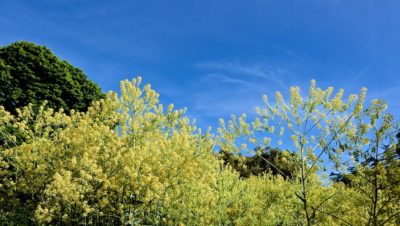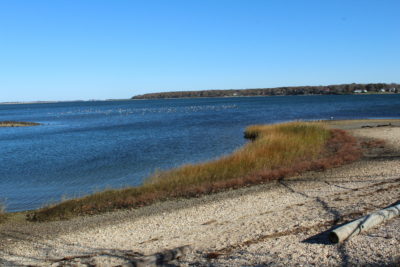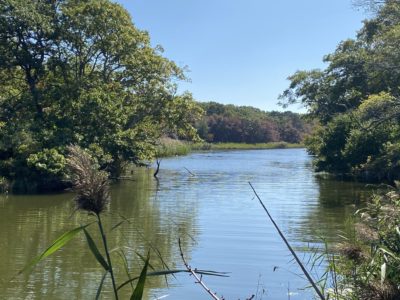Our Work / Stewardship
Sagg Pond Watershed
Like many of our ponds and bays on Eastern Long Island, Sagg Pond has suffered from the effects of excessive nutrient loading from various sources. In 2019, Peconic Land Trust began building a coalition of partners, including Stony Brook University, committed to studying numerous issues that plague the pond with the hope of implementing solutions to improve the resilience of this fragile, and precious, place.
The preliminary findings confirmed that an over-abundance of nitrogen and other nutrients in the water leads to harmful algal blooms in Sagg Pond. The likely sources of nitrogen include fertilizer runoff from farms and lawns, aging septic systems, legacy nitrogen from numerous sources found in groundwater and (to a lesser degree) atmospheric deposition.
In 2021, with the cause of the algal blooms identified, the Trust contracted scientists from Cornell Cooperative Extension’s (CCE) Marine program to research the locations of nitrogen-rich groundwater seepage into the pond and potential remediation methods to remove nitrogen before it reaches the pond.
Once the sources of groundwater seepage areas were identified, we began the process of locating areas for the installation of Permeable Reactive Barriers (PRBs). PRBs are a remediation method that breaks down nitrogen and other nutrients before they reach the pond using natural materials such as wood chips. The first PRB was installed in 2023, with at least two more device installations planned for the next 12-18 months.
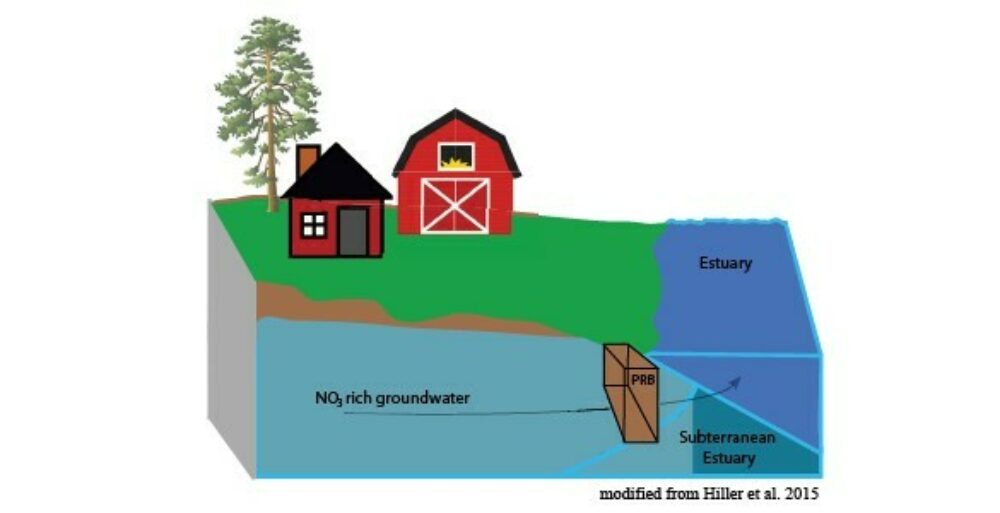
Schematic from Cornell Cooperative Extension of a PRB at the edge of a farm field adjacent to an impaired waterbody.
Another important tool for limiting nitrogen from entering the pond is to upgrade antiquated septic systems. There is significant public funding available to assist homeowners to replace their traditional septic systems with Innovative/Alternative Systems (I/A systems). However, few homeowners have made the switch so far. The major obstacle is that the criteria for selecting among the available I/A systems is complex. Also, the regulatory process of getting one installed is complicated.
To accelerate the upgrading of septic systems within both the Sagg Pond and Georgica Pond communities, the New York State Center for Clean Water Technology at Stony Brook University (CCWT) has hired a manager to help. Tom Varley will help homeowners navigate the unwieldy process of upgrading their systems. The Trust is funding the position for CCWT. Homeowners can reach out to Tom Varley at thomas.varley@stonybrook.edu.
This critical research and remediation work is only possible because of the passion and generosity of the Sagg Pond community. We’re so grateful for your support!
Support
Please help us reach our $495,000 goal for 2024 to support the ongoing research, remediation, and restoration projects to revitalize Sagg Pond in Sagaponack, NY. This effort will eventually help coastal pond improvements across the East End and beyond. Help us reach our goal by donating to the Sagg Pond Restoration Fund today!
With your help, we can fund the important work of CCE and the CCWT as they begin field piloting work and laboratory research.
Working with the team at CCE, CCWT, and other partners, your support will allow us to:
- Continue to install permeable reactive barriers in key areas around the pond. They will break down excessive nutrients and harmful chemicals before they reach the pond.
- Educate watershed residents about nitrogen-reducing I/A septic systems and turf management practices.
- Support further research and development, like the purchase of an auger to enable larger test wells to document results.
- Work with the septic systems manager from the CCWT to install I/A septic systems in homes with public subsidies.
- Sustain the Trust’s coordinating role in this crucial work.
- Leverage private dollars to unlock public funding earmarked for water quality improvement projects.
- Inform future remediation work across the East End and beyond.
Thanks again to the scientists, students, neighbors, donors, and supporters who have already committed so much to Sagg Pond's restoration. You're making a lasting impact on the future of Sagg Pond - both now and for future generations. Thank you!
Learn More
You can make a difference. Here’s how.
Small changes in how we care for our lawns, gardens, and houses can make a lasting impact in the health and vitality of this place we call home. Here are just a few ways you can make the Sagg Pond watershed a healthy place to live!
Reduce or eliminate chemical inputs into the soil from landscaping.
- Meet with Bruce! Bruce Horwith, the Trust's Natural Resource Consultant is offering free, at-home consultations to homeowners in the watershed. This is a great opportunity to review on-site methods to help you reduce your nitrogen footprint and restore the pond's water quality. Email Bruce to schedule a consultation today!
- Meet with the Perfect Earth Project! The Living Lands Program, a new initiative of the Trust and Perfect Earth Project, is designed to educate homeowners on proper lawn care and maintenance. Perfect Earth Project promotes toxin-free lawns and landscapes for the health of people, their pets, and the planet. Visit their website for links to resources and information on lawn and landscape care.
Maintain and upgrade your home septic system.
- Meet with Tom! Tom Varley can help homeowners navigate the unwieldy process of upgrading their septic systems. Email Tom for more information and to set up a call.
- Hear from a neighbor! Jamie and Daniel live in the Sagg Pond Watershed and recently upgraded their septic system with Tom’s help. Read their story and learn some tips for upgrading your own system.
- Learn about the Trust’s example project in Amagansett. The Trust replaced a cesspool with a Nitrogen Reducing Biofilter system at one of our properties located in the Three Mile Harbor sub-watershed.
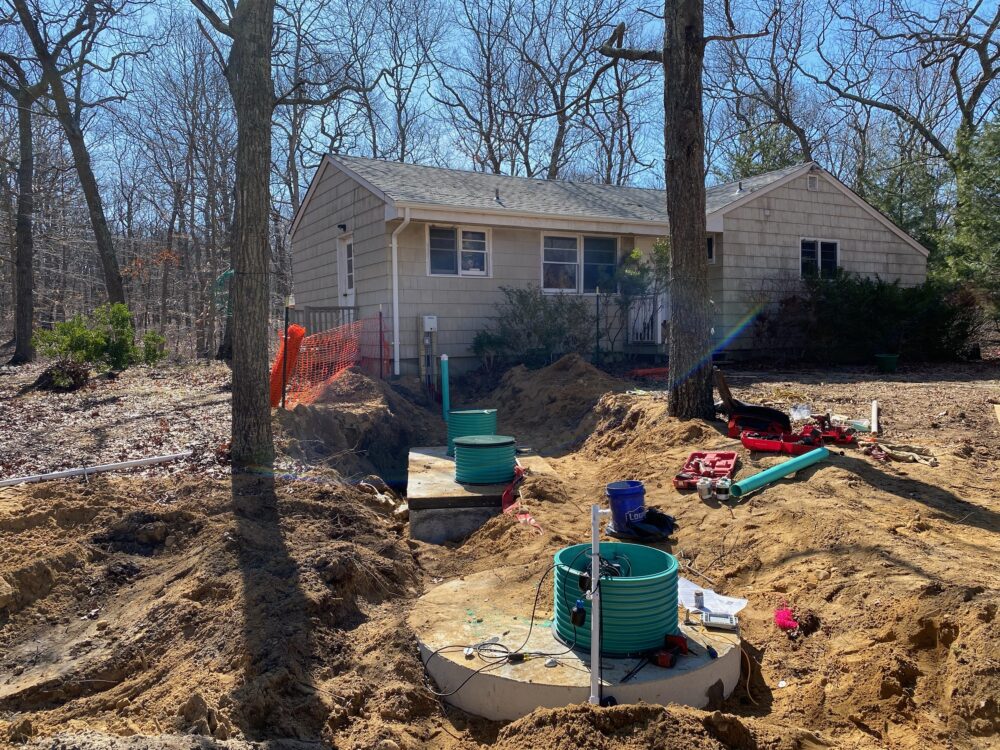
Photo Credit: PW Grosser
Share what you learned with your friends and neighbors.
- CCE's Groundwater Program website page is a great resource for more information on the causes of pollution in our bays and ponds, the impacts, and the various solutions -- including Permeable Reactive Barriers.
- CCWT's Low Nitrogen Septic System Upgrades fact sheet.
Support this work with a donation to the Sagg Pond Restoration Fund.
Stay in the loop! Sign up for our quarterly emails to stay informed about this ongoing work and to learn how you can make a difference.
Video
On April 25, 2024, residents of the Sagg Pond watershed, along with project supporters, public partners, and other community members, were invited to learn more about research and remediation work being conducted at Sagg Pond.
Dr. Chris Gobler, Director of the Center for Clean Water Technology (CCWT) at Stony Brook University, and Thomas Varley, watershed Manager for Georgica and Sagg Ponds, discussed I/A wastewater systems and the public funding available for homeowners to update antiquated septic systems. We heard from homeowners within the Sagg Pond Watershed who made the switch thanks to Tom’s help - and would happily go through the process again!
To learn more about this restoration effort, and to find out how you can lead the charge for a cleaner, safer Sagg Pond, watch the recording below!
Partners
Cornell Cooperative Extension of Suffolk County:
- Deborah Aller, PhD: Agricultural Stewardship Specialist (bio)
- Molly Graffam, PhD: Water Resource Geochemical Specialist (bio)
Bruce Horwith, Peconic Land Trust's Natural Resource Consultant
Ronald J. Paulsen PG: Hydrogeologist/Groundwater Specialist, Coastline Evaluation Inc. (CLEAR)
New York State Center for Clean Water Technology at Stony Brook University & The Gobler Laboratory at Stony Brook University


